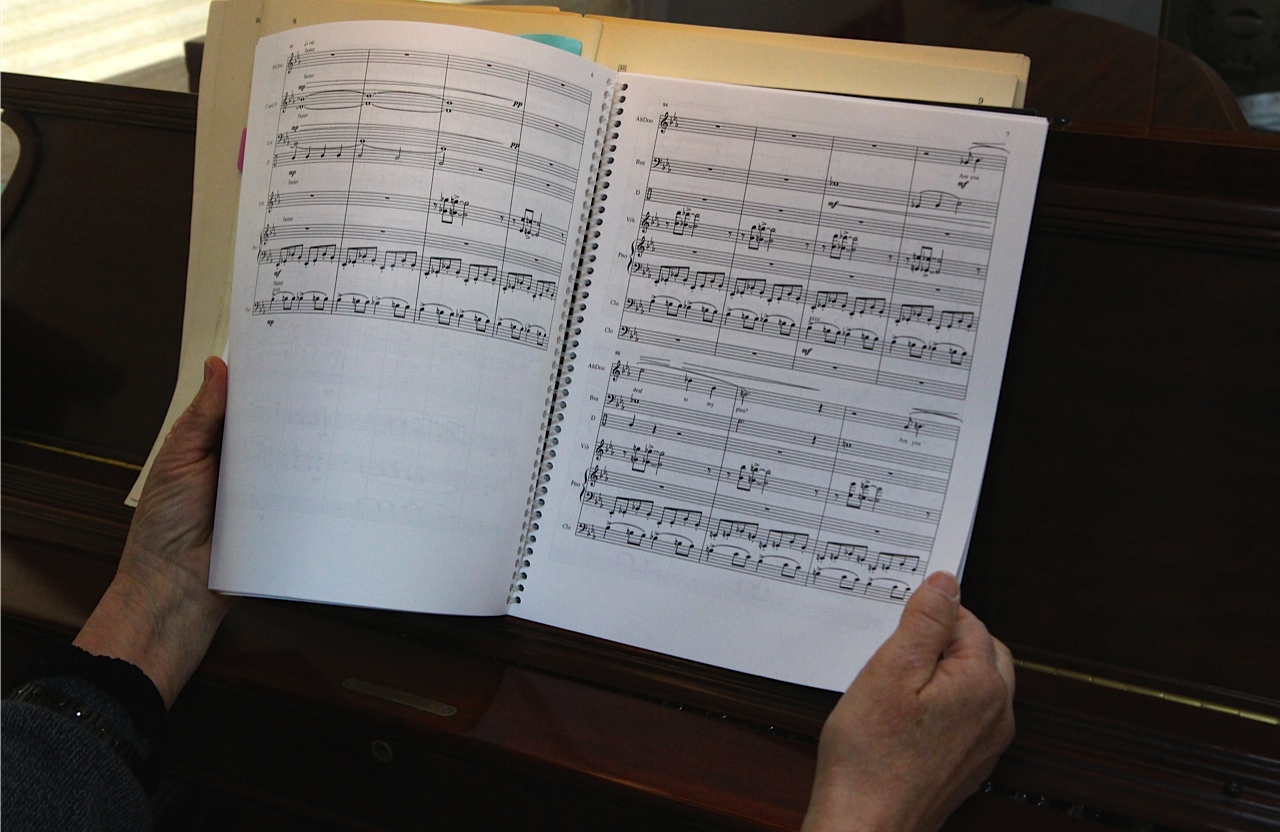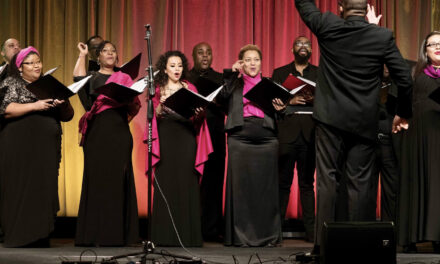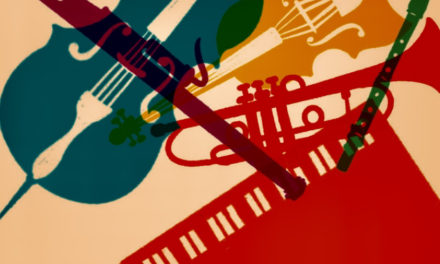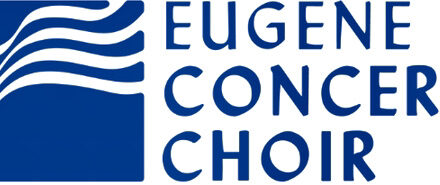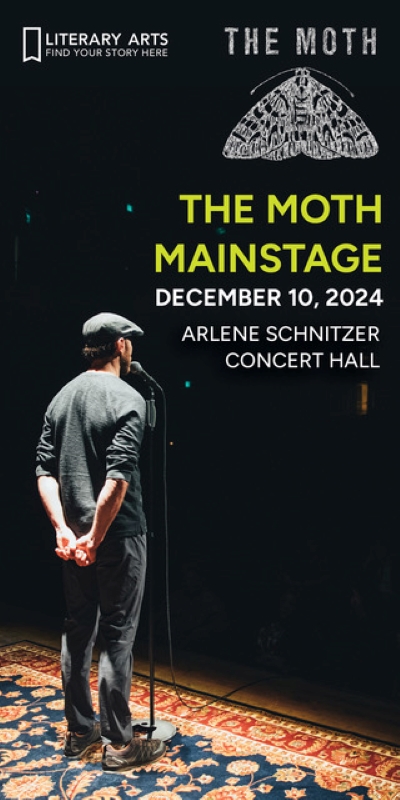(Above: Composer Anice Thigpen leafs through the score of her opera, “The Woman of Salt.” Photo by Randi Bjornstad)
By Randi Bjornstad
Several weeks ago, soprano Laura Wayte gave a “workshop performance” at Tsunami Books, where she sang, among other operatic selections, excerpts from a new opera written with her voice in mind by scientist-turned-composer Anice Thigpen.
On April 15, the two will get together again, this time in Aasen-Hull Hall in the music department at the University of Oregon, to present “Art + Healing: An evening of opera and conversation,” on the way to a full staging of Thigpen’s opera, “The Woman of Salt,” that will be performed on June 23.
Besides more excerpts from “The Woman of Salt,” this time with full instrumental accompaniment, the concert also will include selections from another new opera, UO graduate student Daniel Daly’s “The Banshee,” as well as a discussion about the way composers — and performers — use opera as a way of reflecting and reconciling their life experiences.
In Thigpen’s case, writing an opera grew out of a long-ago trauma that haunted her until she finally realized that processing the experience in the form of art was the only way to vanquish its hold over her.
“In the 1980s, I incurred traumatic psychic wounds as a young mother, and from then on the trauma was an open part of my life — it occupied the past, present and future — as something that could not heal itself,” Thigpen said. “I learned that I had to compartmentalize the trauma to keep it at bay, but at some level it was always there.”
It wasn’t until she moved to Eugene 12 years ago that she “began to meet the crucial people” that would help her find the way to heal, she said.
“When I met my spouse and she and I moved to Eugene from Fort Worth (Texas), I felt like this was the promised land,” Thigpen said. “We felt like Eugene was a safe and accepting place, where we could walk down the street and just be ourselves.”

Anice Thigpen, composer of a semi- autobiographical opera, “The Woman of Salt,” rehearses with soprano Laura Wayte (Photo by Randi Bjornstad)
It wasn’t long before she met what she calls her “crucial trio,” starting with Wayte and her husband, Lawrence Wayte, who teaches musicology and composition at the UO. The third is Jungian analyst Jennifer Gordon, who will lead one of the April 15 discussions on the way that composers and singers use opera as a conduit for expressing human emotions.
“When we came to Eugene, we moved in across the street from the Waytes, and suddenly Laura came out and called, “ ‘Hello, hello’ in this really soprano voice, and said, ‘I see you have a grand piano.’ ” Thigpen recalled. “That was the beginning of my journey with Laura and Larry Wayte.”
Through working on her trauma issues with Gordon, scientist Thigpen — her academic background was in chemistry and biochemistry — learned about the strength of dreams and the subconscious and the importance of myths and legends in human consciousness.
“Because Laura and I became friends and she was active in Eugene Opera, we started going to their performances, and that’s when everything started coming together,” Thigpen said. “After we went to ‘Nixon in China’, I realized I had a huge preference for contemporary opera, and that gave me the idea that I should try to write an opera out of my own experience, and that’s when my universe just got so much bigger.”
Both women clearly remember the day Thigpen, who had no particular music background beyond childhood piano lessons, appeared at the Waytes’ front door and asked Larry Wayte to teach her composition.
“He said, ‘They teach classes in that at the UO,’ and I said, ‘I don’t want that — I want you to teach me,’ ” Thigpen recalled. “Then he said, ‘Okay,’ and we started.”
There were fits and starts, including a break of a couple of months after she had a recurrence of her psychological difficulties, “and then one day I showed up with two measures of mis-scored music, and I said to him, ‘I think this is the beginning of an opera,’ ” Thigpen said with a laugh.
“I had gradually developed this sense of a central character of my opera — it was the wife in the (biblical) story of Lot, who was never called by a name but I called her AhDoo. She was accompanied by a cohort of feminine entities, and that’s when I realized they were my story.”
She and Larry Wayte worked together for four years, and “The Woman of Salt” is the tangible result, with Thigpen’s own emotional progress as the more intangible reward.
“I am different now — I feel healed,” she said. “I can talk about my past experience in a way that’s not so personal; I am able to to transcend it and view it in a more objective way. I lived within that opera for four years as I worked on it and the characters made themselves known to me. And Laura’s voice is the one that can interpret it perfectly.”
For her part, Laura Wayte knew what her husband was helping Thigpen to work on and how the lead part was being crafted for her voice, “and I didn’t know what to feel about it all,” she admitted.
“I didn’t know what Anice (Thigpen) would eventually hand me. And it was kind of wacky to have a friend who was doing this big project — I thought what if, when it’s finished, it’s awful — but when it was done, it was absolutely the opposite.”
The finished production in June will have nine solo parts, a chorus, and a five-piece orchestra, Wayte said, as well as a conductor, set design, stage direction and costumes.
“I am very excited to perform this work,” Wayte said. “I know that when I share this story with an audience, I have to help them understand that it is real.”
The Woman of Salt
What: Art + Healing: An evening of opera and conversation
When: 7 p.m. on April 15
Where: Aasen-Hull Hall, 190 Frohnmayer Music Building, 961 E. 18th Ave., on the University of Oregon campus
Tickets: Sliding scale, $15 to $25
Information: thewomanofsalt.com

